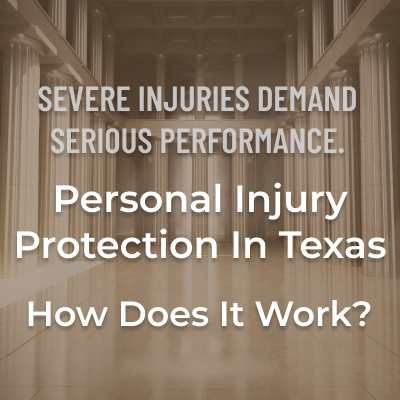
When purchasing insurance, it is easy to become confused by the litany of different coverage options that are offered by the insurance company.
This blog post will explain the difference between two important, but quite different, types of coverage: Personal Injury Protection (PIP) and Medical Payments Coverage (Med Pay).
Both PIP and Med Pay provide coverage for medical expenses that arise from injuries sustained in a car accident. PIP coverage is generally more expensive but provides more benefits.
It is worth noting that insurance companies will not let consumers purchase both coverages: you must choose either PIP or Med Pay.
If you have any questions about purchasing insurance, contact the experienced personal injury lawyers at Armstrong Lee & Baker LLP today.
In this article, we will lay out the difference between personal injury protection vs medical payments in Texas.
What’s Personal Injury Protection in Texas?
Personal Injury Protection, or PIP, also provides coverage for medical expenses that are associated with a car accident. However, PIP insurance typically provides more coverage than one receives with Med Pay. First, PIP often extends coverage to expenses associated with physical or occupational therapy, psychiatric treatment, and other rehabilitation costs.
PIP also typically provides coverage for 80% of lost wages, a death benefit, and other nonmedical expenses that are related to the car accident.
PIP may also provide “no-fault” coverage to those who carry it, which means that an insured is entitled to use this coverage even if at fault for an accident.
Unlike Med Pay, however, the insurance company does not retain subrogation rights.
This means that if the other driver is found to be at fault, the insurance company is not entitled to reimbursement for the medical expenses that were covered under the PIP policy.
Therefore, although PIP is usually more expensive, it provides greater coverage and benefits than Med Pay offers.
What is Med Pay Coverage in Texas?
Med Pay covers the “reasonable and necessary” medical expenses an insured incurs after being involved in a car accident. Reasonable expenses could include those costs associated with doctor visits, ambulance transportation, chiropractic treatments, X-rays, hospitalization, and even funeral expenses.
However, it is important to note that Med Pay cannot and does not act as a substitute for regular health insurance.
Rather, Med Pay can only be used in a very specific situation: for those medical expenses that you, or your passengers, payor incur as a result of a motor vehicle accident.
Med Pay provides “no-fault” coverage to those who carry it, which means that an insured is eligible to use this insurance regardless of whether he or she caused the accident.
Importantly, however, the insurance company retains subrogation rights on payments made under your Med Pay coverage.
This means that if an insured is not the at-fault driver, the insurance company is entitled to be paid back when the other driver’s insurance company accepts fault.
This is one reason that Med Pay coverage is generally less expensive than PIP coverage.
Contact a Houston Personal Injury Lawyer Today
Dealing with the aftermath of a motor vehicle accident can be frustrating, time-consuming, and confusing.
If you were hurt in a car accident and feel that your insurance company is not looking after your best interests, or that the at-fault insurance provider is refusing to pay you the compensation you are entitled to, contact the personal injury lawyers at Armstrong Lee & Baker LLP for a consultation regarding your rights and available options.
Do I really need an attorney if I have Personal Injury Protection (PIP) or Med Pay coverage?
While having PIP or Med Pay coverage is beneficial, hiring an attorney can still be advantageous in certain situations. Your attorney will be able to help with negotiating with insurance companies and ensure you receive the maximum compensation you are entitled to.
Can I handle the insurance claims process on my own without an attorney?
It is possible to handle insurance claims on your own but keep in mind that insurance companies have teams of adjusters and lawyers working to protect their interests.
Additional Articles
If you found this article helpful, you may also be interested in the following:
- Five Things to Do After a Car Accident
- Four Benefits of Uninsured/Underinsured Motorist Bodily Injury Insurance
- Three Types of Property Damage You Can Recover After an Accident
- What Is the Difference Between a Third-Party and First-Party Insurance Claim?
Frequently Asked Questions
Absolutely nothing. At Armstrong Lee & Baker LLP, our attorneys work on a contingency fee basis. This means that you owe us nothing unless we win your case, whether that’s in the form of a settlement or a judgment. We offer a free consultation to anyone who thinks they might have a personal injury case.
We suggest speaking with an attorney as soon as possible after your injury. Something to keep in mind is that all personal injury cases need evidence, and that evidence often degrades over time. As a result, many jurisdictions have a strict statute of limitations (or time limit) for filing a claim. In Texas, most victims have only two years from the date of injury to file, so it is important to start building your case immediately.
In the state of Texas, employers have the option of filing for workers’ compensation insurance. This policy covers them in case an employee suffers an injury on the job. However, some employers choose to be non-subscribers, which means they opt out of this coverage and lose certain legal protections. This means that if an injured employee sues them after a work injury, they may end up paying more damages. In addition, they may be liable for pain and suffering, punitive damages, and medical benefits. Learn more about non-subscriber injuries here.
The Texas Department of Insurance (TDI) keeps track of employers that report their non-subscriber status. Currently, you can find a spreadsheet of every reported non-subscriber business in Texas under TDI’s workers’ compensation insurance coverage verification page. This includes the business address, business name, and filing dates. Learn more here.
There are a few different ways to manage your bills while waiting for your case to settle. For medical treatment, it is common to arrange a lien with the doctor’s office or hospital. A medical lien is essentially an agreement to pay back your treatment costs with a portion of your potential settlement. Another option for miscellaneous bills, such as rent, utilities, or other essential expenses, is lawsuit funding. Much like a lien, you pay these loans back with a portion of your settlement or judgment. However, these loans have high interest rates and fees, so be sure to discuss this option with your attorney.
